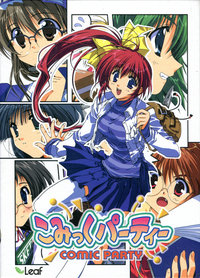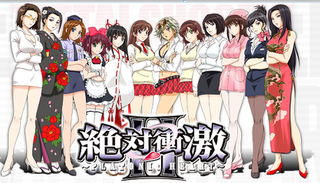
Comic Party, sometimes abbreviated to ComiPa, is a dating sim video game by the Japanese game studio Leaf. It was first released on May 28, 1999 for Windows with adult content, but re-released with it removed for the Dreamcast, Windows, and PSP. The main focus of the game is the creation of various dōjinshi by the player's character, during which there are varied opportunities to interact with a cast of girls.

Chiwa Saitō is a Japanese voice actress represented by I'm Enterprise. She is best known for her anime roles, which include Hitagi Senjougahara in Monogatari, Homura Akemi in Puella Magi Madoka Magica, Yona in Akatsuki no Yona, Chloe von Eizenbern in Fate/kaleid liner Prisma Illya, Caster in Fate/Grand Order series, Aika S. Granzchesta in Aria, and Jean in Genshin Impact and Aoi Asahina in the Danganronpa video games and anime.
Hitomi Nabatame is a Japanese actress and singer who is affiliated with Ken Production. She also sings opening themes for Nogizaka Haruka no Himitsu under the name "Miran Himemiya and Chocolate Rockers".
Yuka Inokuchi is a Japanese voice actress who is affiliated with Ken Production. She is originally from Kurume, Fukuoka Prefecture. She voices Uzume in Ai Yori Aoshi, Rin Kamishiro in Maburaho, Anju Maaka in Karin, Tabitha in The Familiar of Zero, Nao Yorihime in Yosuga no Sora, and Ai in Dragon Crisis!. She also goes by Ayaka Kimura and is known for her extensive work in visual novels and adult original animation videos. Other roles include Momiji in Maple Colors, Aoi Niiyama in Akiiro Renka, Chisa in Gift, Kana Suoin in Otome wa Boku ni Koishiteru, Mikan in Wanko to Kuraso, Yui Kuroda in Hoshiuta.
Magic User's Club is a magical girl/boy anime created by Triangle Staff and Junichi Sato. It was first released as a six-part OVA in 1996 and then a 13-episode TV series in 1999, which was broadcast by WOWOW, and then by the anime television network Animax across its respective networks worldwide, including Southeast Asia, South Asia and other regions. Produced by Bandai Visual, the series is directed by Sato, with Chiaki J. Konaka handling series composition for the TV show, Ikuko Itoh designing the characters and Michiru Ōshima composing the music. There were also two manga series made, a shōjo manga version by Tami Ōta and shōnen manga version by Satomi Akai.

Magical Canan (まじかるカナン) is a Japanese adult visual novel developed and published by Terios. It was later adapted into two erotic OVA series and a 13-episode anime television series. Both OVA series were previously licensed for distribution in North America by NuTech Digital in 2004. Since 2006, the OVAs are licensed by Adult Source Media. The TV series has been licensed for distribution in the Philippines and dubbed in Tagalog by Hero and licensed in Taiwan by Mighty Media Co., Ltd. The game has never been licensed for distribution in North America. The anime television series has been licensed for a North American release by Discotek Media.

Tona-Gura! (となグラ!) is a Japanese romantic comedy manga written and illustrated by Hidetaka Kakei. It is centered on four childhood friends and the romantic relationship between two of them. It was serialized in Comic Rush from 2004 to 2011. An anime television series adaptation was broadcast in 2006.
Magical Emi, the Magic Star is a magical girl anime series by Studio Pierrot. It was simultaneously released as a manga by Kiyoko Arai. The third magical girl series created by Studio Pierrot, Magical Emi also appears in two feature-length OVAs, as well as the Adesugata Mahou no Sannin Musume and Majokko Club Yoningumi A-Kukan Kara no Alien X OVAs.

KimiKiss is a Japanese dating simulation game for the PlayStation 2. Developed by Enterbrain in 2006, KimiKiss has become a media franchise, which includes 5 manga adaptations, a light novel, and an anime television series directed by Ken'ichi Kasai.

Stitch! is a Japanese anime spin-off of Disney's Lilo & Stitch franchise. It is the franchise's second television series, after Lilo & Stitch: The Series. The anime series aired in Japan from October 2008 to March 2011, later receiving additional television specials in 2012 and 2015. It features a Japanese girl named Yuna Kamihara, who takes the place of Lilo Pelekai as the best friend of the titular Stitch, and is set on a fictional island in the Ryukyus off the shore of Okinawa called Izayoi instead of Kauai, Hawaii.

Master of Martial Hearts, originally titled Zettai Shougeki: Platonic Heart, is a 2008–2009 Japanese original video animation series created by Studio Kikan and Shochiku. It concerns a high school girl who gets involved in a series of fights against other young women with the Martial Heart as the prize; a jewel that can grant any wish. On January 7, 2010, Funimation Entertainment announced that they had licensed the OVA series in English. The series was released in North America on August 10, 2010.

B Gata H Kei is a Japanese four-panel manga series by Yoko Sanri. It was published by Shueisha and ran in Weekly Young Jump from 2004 to 2011. The story focuses on the salacious wishes of a high school girl, whose perceived drawback of being a virgin leads to her lusting after and pursuing a rather average and unremarkable boy in her class.

Kanae Ito is a Japanese voice actress and singer from Nagano Prefecture. She is affiliated with Aoni Production and music publisher Lantis.
Fusé: Memoirs of the Hunter Girl, also known as Fuse: A Gun Girl's Detective Story and Fusé: Memoirs of the Huntress, is a 2012 Japanese animated film directed by Masayuki Miyaji based on Kazuki Sakuraba's book Fusé Gansaku: Satomi Hakkenden. Both novel and film are adaptations of Kyokutei Bakin's epic novel Nansō Satomi Hakkenden, focusing on a female hunter named Hamaji.

If Her Flag Breaks, also known as Gaworare (がをられ), is a Japanese light novel series written by Tōka Takei, with illustrations by Cuteg. Kodansha has published 16 volumes from December 2011 to September 2016. A manga adaptation and two spin-off series have been serialized in Kodansha's magazines. An anime adaptation produced by Hoods Entertainment aired in Japan from April to June 2014, and is licensed in North America by NIS America.

So Cute It Hurts!!, known in Japan as Kobayashi ga Kawai Sugite Tsurai!!, is a Japanese manga series written and illustrated by Gō Ikeyamada. It was adapted into an original video animation, included in volume 3 limited edition of the series. The manga series ran in the Sho-Comi manga magazine from 2012 to 2015, and was compiled into 15 tankobon volumes. An English translation was published by Viz Media, and in Southeast Asia, it was published by Shogakukan Asia.
Monster Strike is an anime series based on the role-playing physics game of the same name developed by XFLAG for iOS and Android platforms. An anime film adaptation titled Monster Strike The Movie was released on December 10, 2016. A second anime film, titled Monster Strike The Movie: Sora no Kanata, was released on October 5, 2018 in Japan. A third film Monster Strike the Movie: Lucifer - Zetsubō no Yoake was slated to be released in June 2020, but was delayed to November 6, 2020 due to the COVID-19 pandemic.

Granbelm is a 2019 Japanese animated television series created and produced by Nexus. The series was directed by Masaharu Watanabe and written by Jukki Hanada, with original character designs by Shinichirou Otsuka, and music composed by Kenichiro Suehiro. Granbelm aired from July 5 to September 26, 2019 on the Animeism programming block. The series follows a group of 7 magical girls that pilot giant robots called "Armanox", where they fight in a battle royale where the winner obtains the title "Princeps Mage", allowing the user to wield all the magic inside the "Magiaconatus".












